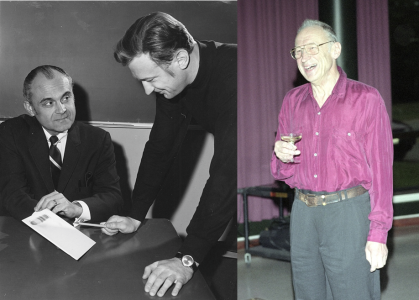
Bartha is best known for his seminal discoveries in the field of bacterial degradation of chemical pollutants and development of bioremediation. He was born in 1934 in Budapest, Hungary, and grew up during World War II and the post-wat Soviet occupation. As a college student, he participated in the 1956 Hungarian Revolution and fled to West Germany when the anti-Soviet uprising was suppressed. In Germany he earned his Ph.D. in 1961 from the University of Göttingen, working with Dr. Hans Günter Schlegel. Bartha then moved to the United States and after postdoctoral work at the University of Washington (where he met his future wife, Susi) he in 1964 came to Rutgers University as a Research Associate to work with David Pramer on biodegradation pf pesticides. He was promoted to Research Assistant Professor in 1966 and in 1968 to a tenure track faculty line in the Department of Microbiology and Biochemistry. He retired in 1998 after distinguished career in research and teaching.
At Rutgers Bartha made seminal contributions to the emerging field of bioremediation, harnessing naturally occurring bacteria to neutralize toxic environmental pollutants. His pioneering discoveries had important applications and laid the foundation for the use of microbes in the clean-up of environmental disasters including oil spills and Superfund sites. He and his team developed the use of oil-binding fertilizers to promote the activity of oil-degrading bacteria for use in marine oil spills. Many years later this methodology was successfully used for treatment of oiled beaches after the Exxon Valdez oil spill in Alaska. Bartha’s group also worked on the biodegradation of polycyclic aromatic hydrocarbons and the fate of pesticide residues in soil. Another key advance was in demonstrating the methylation and well as demethylation of mercury by anaerobic sulfidogenic bacteria, key reactions affecting the toxicity and transfer of mercury in the food chain. Bartha trained over 25 PhD students who went on to careers in academia, industry and government. He and his team authored over 150 research papers in the field of environmental microbiology. Bartha was co-author (with Ronald Atlas, his former Ph.D. student) of the widely used textbook on microbial ecology, first published in 1981 and updated in three subsequent editions.
Richard Bartha is fondly remembered by his past colleagues, students and friends.
An obituary is available at: https://www.bradley-kosec.com/obituaries/richard-bartha
A tribute post by Ray Sullivan appears on the Theobald Smith Society (NJ Branch of ASM) website at https://www.njmicrobe.org/post/richard-bartha-1934-2025?utm_source=linkedin&utm_medium=blog.post-promoter&utm_campaign=a25e62d9-b70b-4e95-b60b-2ed2458e119f


